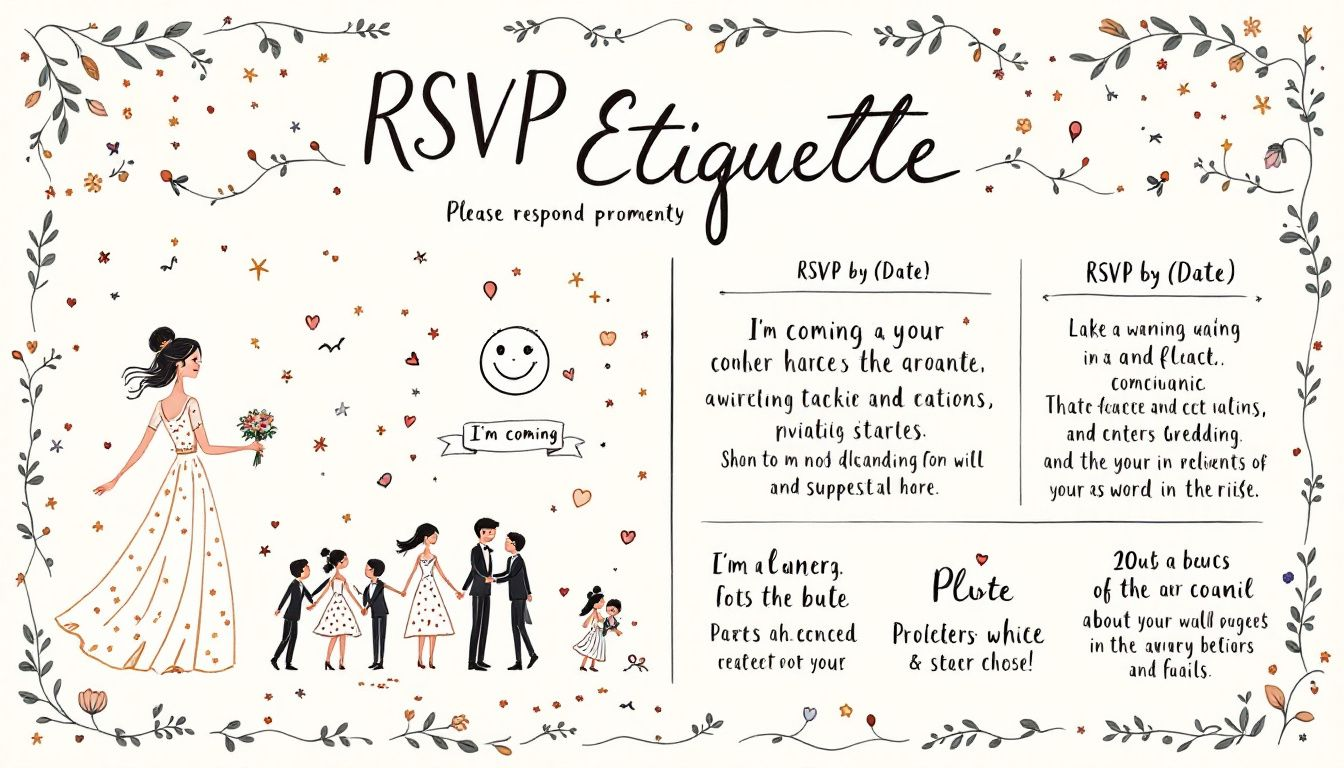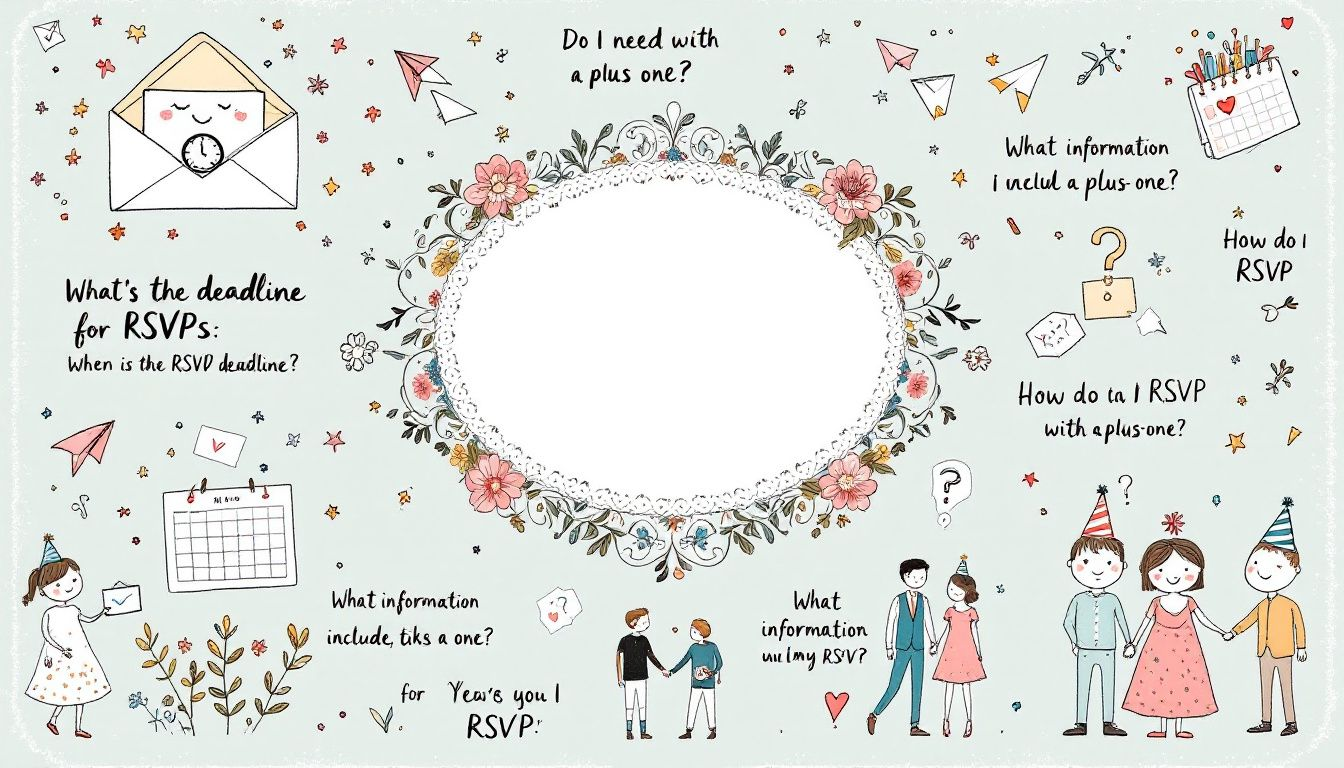RSVP invite meaning is simple: it stands for ‘repondez s’il vous plaît,’ or ‘please respond.’’ This request helps the host plan the event. In this article, we’ll explore why replying is crucial and how to do it right.
Key Takeaways
-
RSVP means ‘please respond’ and helps hosts plan their events by confirming attendance.
-
Promptly responding to RSVPs is crucial for event planning and shows respect for the host’s efforts.
-
If your plans change after RSVPing, inform the host as soon as possible to avoid any logistical issues.
What Does RSVP Mean?

The term RSVP originates from the French expression “répondez s’il vous plaît,” which translates to “please respond.” It is a courteous call for confirmation that commonly appears on invitations, requesting guests to affirm their presence.
Inclusion of an RSVP in an invitation serves as a crucial prompt designed to assist the event organizer with preparations. By responding, you enable the host to adequately arrange for sufficient food and ensure comfortable arrangements are in place for everyone attending.
Thus, whenever you come across an RSVP request within an invitation, it’s important to recognize that your timely reply is greatly appreciated. Your response contributes significantly towards helping your host execute a successful event.
The Role of RSVPs in Event Planning
The practice of requesting RSVPs is integral to organizing a successful event, as it requires guests to communicate their intention to attend. This allows hosts to effectively manage their guest lists and tackle the complexity associated with monitoring attendance at large gatherings.
It is essential for hosts to ascertain how many guests will be present in order to ensure that there’s ample food, seats, and accommodations tailored according to individual preferences and dietary needs. RSVPs also facilitate planning related aspects such as transportation logistics — factors which contribute significantly toward accommodating every attendee adequately.
Finally, securing RSVP responses can have a positive impact on an event’s atmosphere by allowing attendees’ music tastes or seating preferences. By addressing these details beforehand, hosts are capable of crafting an inviting environment that amplifies each guest’s enjoyment of the occasion and enhances its overall distinctiveness.
How to Respond to an RSVP Invitation
Following the instructions on an RSVP invitation meticulously is key, regardless of whether it pertains to wedding invitations or a more informal event. A swift response not only signifies respect, but also aids the host in orchestrating their plans effectively.
RSVPs come in various forms and while each method may have its subtle differences, they all converge on one goal: to confirm your presence at the event. Options range from classic reply cards accompanying an invitation to contemporary digital RSVP platforms.
Using a Response Card
Traditionally, RSVPs are made through the use of response cards which often come with a line for your name, a checkbox to indicate attendance, and occasionally choices regarding meal preferences. When completing a response card, it is important to include your title (such as Mr., Ms., or Mrs.) if prompted, spell out your full name clearly and list any additional guests you intend on bringing.
After filling in all the necessary details on the response card, mail it back to the address provided. By sending in your confirmation promptly, you help ensure that the host can receive an accurate headcount timely and proceed with organizing event specifics accordingly. This simple act reflects both respect towards those hosting the gathering and eagerness about attending their event.
RSVP Online
The trend of digital communication has made it commonplace for guests to RSVP online. Invitations often feature a link directing invitees to an online platform, enabling them to easily confirm their presence with minimal effort. This approach is not only user-friendly for the invitees but also offers instant confirmation to those hosting the event.
To respond via RSVP online, adhere strictly to the guidance outlined in your invitation. Typically, this entails going onto a specific webpage, inputting your personal information and selecting an option that verifies you’ll be attending. The process is swift and straightforward, guaranteeing that hosts receive acknowledgement of your intended participation without delay.
RSVP Etiquette Tips

Adhering to RSVP etiquette is crucial for showing respect and consideration towards your host. Make it a priority to respond to an invitation by the given deadline, signaling that you recognize and appreciate the efforts of those organizing the event while confirming your attendance.
In situations where it’s not clear if a plus-one is welcome or if RSVP instructions are ambiguous, take initiative by reaching out to your host for clarification rather than making assumptions. This attention to detail helps avoid any potential disruptions in their arrangements.
Should there be any changes in your availability after having responded affirmatively, promptly inform the host so they can modify their event plans accordingly. Quick communication in such circumstances demonstrates courtesy on your part and contributes greatly toward ensuring that the event proceeds without unnecessary complications.
Why It's Important to RSVP

RSVPing is not just a formality—it’s a vital part of event planning. Timely responses help hosts make arrangements based on the expected number of guests, ensuring there’s enough food, seating, and other essentials. Ignoring an RSVP can be quite inconvenient for the host, and responding late is often viewed as rude. A prompt response shows respect for the host’s efforts and helps avoid any unnecessary stress.
If you have prior commitments, it’s wise to decline the invitation. It’s better to say no than to accept and not attend. Responding to an RSVP, even if you cannot attend, is a courteous gesture that reflects well on you. It shows that you appreciate the invitation and respect the host’s planning process.
So always make it a point to respond promptly and thoughtfully.
Handling Changes After RSVPing
Life happens, and sometimes plans change unexpectedly. If you need to change your RSVP, inform the host as soon as possible. This allows them to make the necessary adjustments without too much hassle.
If you anticipate a change in your plans, notify the host before the RSVP deadline. If you have to cancel shortly before the event, offering to cover the cost of your meal can be a thoughtful gesture.
These actions show respect for the host’s efforts and mindfulness of the impact of your change in plans.
Common Questions About RSVPs

Should you find yourself unsure about how to respond due to ambiguous RSVP instructions, it is completely appropriate to contact the host for Information. When an RSVP card isn’t provided, look over the invitation or seek guidance on the event’s official website.
Failure to answer an RSVP may result in confusion and operational problems for those planning the event. If circumstances arise that necessitate changing a previously confirmed ‘yes’ to a ‘no’, it is crucial to inform your host without delay. Offering an earnest apology along with your reason will help preserve amicable relations and facilitate seamless event management.
In instances where you must rescind your acceptance after having responded affirmatively, promptly notify the host of this change. If no explicit request for an RSVP was made within the invitation itself but attendance confirmation is still necessary, take initiative by reaching out directly to confirm whether or not you will be present at their gathering—this practice promotes unambiguous communication and circumvents potential complications.
Summary
To reiterate, the inclusion of RSVPs is an essential component in the orchestration of any event. Grasping both their significance and how they function allows you to confidently and respectfully answer invitations.
It’s important to acknowledge that by providing a swift reply, either through a response card or digitally, you are demonstrating consideration for the work put forth by your host while aiding in ensuring that the event unfolds without a hitch. Thus, always ensure that you RSVP with promptness and reflection.
Frequently Asked Questions
Does RSVP mean you have to reply?
Yes, RSVP means you should reply to let your host know if you’ll attend or not. It’s a courteous gesture, so aim to respond promptly!
What does RSVP stand for?
RSVP stands for “répondez s’il vous plaît,” which means “please respond” in French.
So when you see it, they really want to know if you’re coming!
Why is it important to RSVP?
RSVPing is crucial because it helps hosts prepare properly, ensuring there’s enough food and seating for everyone.
Plus, it shows appreciation for their effort in organizing the event!
How should I RSVP if the invitation doesn't specify?
Just reach out to the host directly and ask how they would like you to RSVP.
It’s always better to get clarity!
Can I bring a plus-one if the invitation doesn't mention it?
It’s best to check with the host before bringing a plus-one, even if it’s not mentioned in the invitation.
A quick message can clarify things and keep it respectful.

